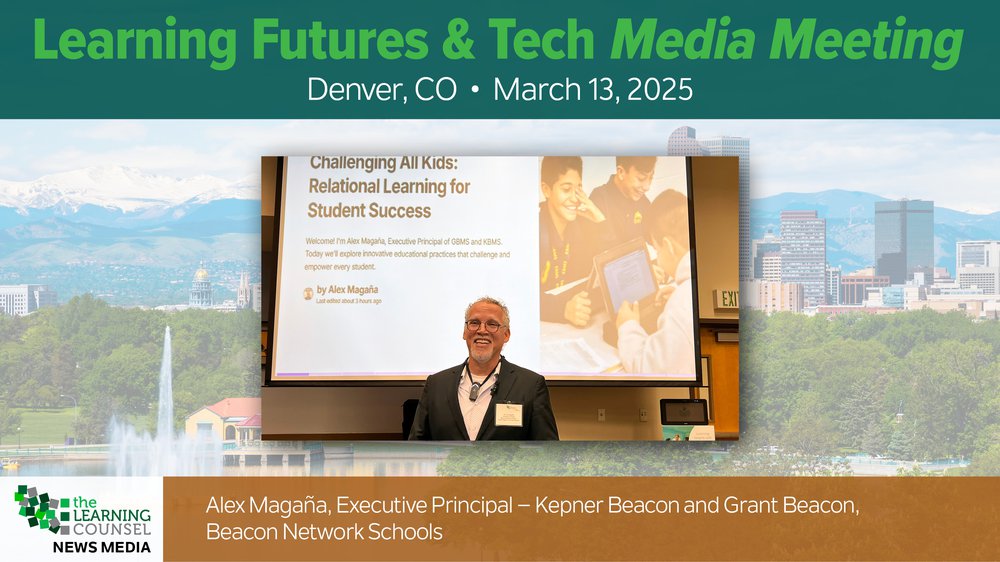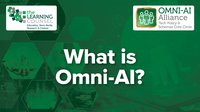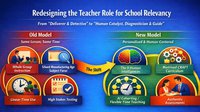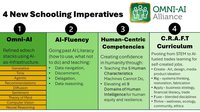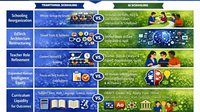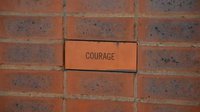At the Denver Learning Futures & Tech Media Meeting, Alex Magaña, Executive Principal of Kepner Beacon and Grant Beacon, Beacon Network Schools, delivered an inspiring presentation on educational innovation, blended learning, and relational learning. Magaña shared his journey of overcoming challenges, embracing student-centered learning, and adapting to the evolving educational landscape.
Facing Challenges Head-On
Magaña began by reflecting on the early struggles he faced as a principal at one of the lowest-performing schools in the district. Determined to improve, he and his team focused on small reading and math classes, strong data-driven strategies, and teacher motivation. Their efforts seemed to pay off when initial test results indicated success.
"I opened the computer, and we were green!" he recalled. "I was high-fiving everyone, making copies—until the next day, when I got a call that the preliminary results were incorrect. We were actually yellow."
This setback forced him to rethink his approach, leading him to the realization that while foundational skills were improving, students were not being sufficiently challenged.
An Unexpected Wake-Up Call
Another defining moment came when he learned that a state-of-the-art charter school was opening nearby, further threatening his school’s already-declining enrollment. His initial reaction? Frustration and complaints.
"I complained to teachers, parents, and students," he admitted. But then, a parent gave him a simple yet powerful piece of advice: “Be innovative.”
This led Magaña to a pivotal moment where he gathered his staff and asked a critical question:
"Do we make the changes, or do we let someone else make them for us?"
The answer was clear: They would take control of their own future.
The Move to Blended Learning
With innovation as the new priority, Magaña and his team embraced blended learning—a combination of online and face-to-face instruction designed to personalize learning experiences.
At first, it was a huge success.
"Engagement was high. Visitors would come in and say, ‘Holy cow!’ Students were connected, we were meeting them where they were, and our test scores improved."
However, after the initial excitement, they hit another obstacle:
"We had essentially created a glorified textbook. Students were on the same tab, doing the same work. We weren’t truly differentiating."
The realization pushed them to refine their approach and ensure AI and technology were being used meaningfully, not just as digital worksheets.
COVID and the Shift in Student Engagement
Then came COVID-19, which completely transformed student behavior and expectations.
"What did kids learn during COVID? Student voice and student choice—mute, turn off screen."
This post-pandemic reality forced schools to rethink engagement strategies. Students had newfound control over their learning, and educators had to adapt accordingly.
The Power of Relational Learning
The biggest lesson Magaña took from these experiences? The need for strong relationships in education.
"I believe strongly that all kids are geniuses. We just need to figure out how to meet them."
He emphasized that relational learning—building connections between students, teachers, and content—is key to long-term success. By personalizing instruction, fostering student agency, and leveraging AI and technology effectively, schools can create more meaningful and impactful learning experiences.
Key Takeaways from Magaña’s Presentation
- Challenges Are Opportunities – Instead of resisting change, schools should embrace innovation and adapt proactively.
- Blended Learning Works—If Done Right – Technology should enhance differentiation and personalization, not just digitize traditional instruction.
- COVID Changed Student Learning Expectations – Schools must acknowledge that student agency has increased and adapt their teaching methods accordingly.
- Relationships Matter Most – AI and technology can help, but human connection is at the heart of meaningful learning.
Moving Forward: A Call to Innovate
Magaña’s story is a powerful reminder that education must continuously evolve to meet students where they are. Schools that embrace innovation, relational learning, and thoughtful technology integration will not only survive but thrive in the ever-changing educational landscape.
"We have to stop complaining and start creating," he concluded. "Because when we take ownership of change, that’s when real transformation happens."
Tune in below to see the full presentation.

